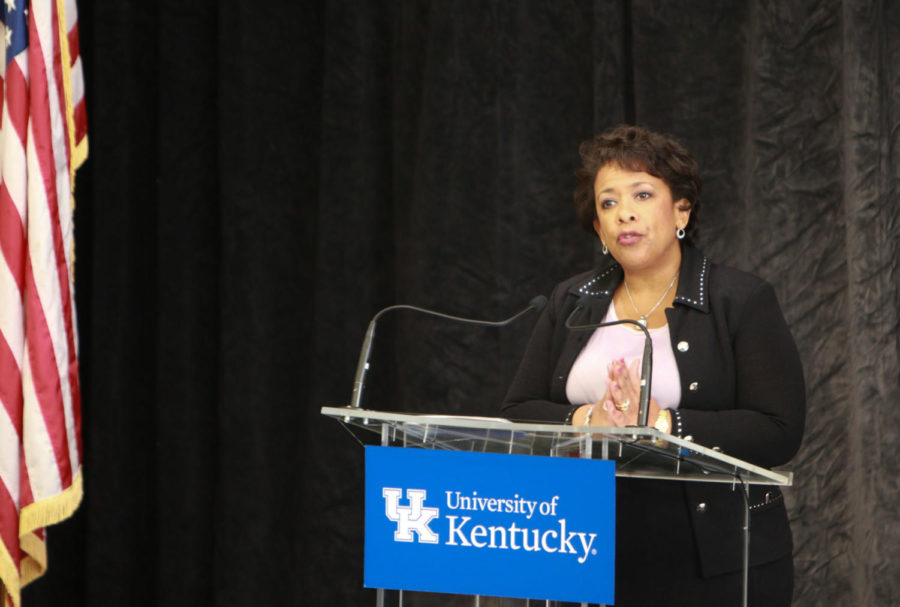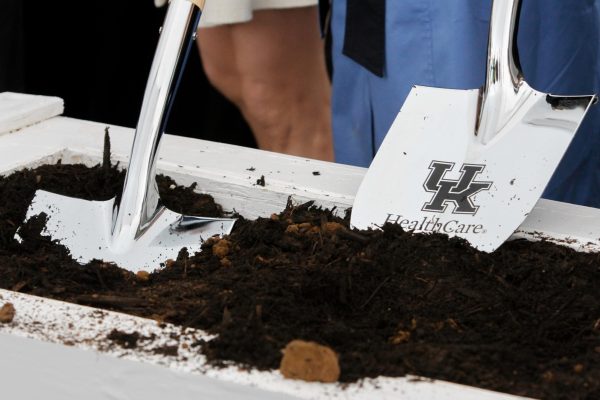U.S. Attorney General Loretta Lynch addresses heroin and opioid epidemic while visiting campus
U.S. Attorney General Loretta Lynch talks about the commonwealth’s heroin epidemic at UK’s College of Pharmacy in Lexington, Ky., on Tuesday, Sept. 20. Photo by Joshua Qualls | Staff
September 20, 2016
Attorney General Loretta Lynch delivered a speech at UK regarding the heroin and opioid epidemic plaguing the country Tuesday afternoon.
Lynch spoke of recent problems regarding overdoses in the area after President Barack Obama proclaimed Sept. 18-23 as National Heroin and Opioid Awareness Week.
Tuesday morning, she met with local parents who have lost their children due to drug abuse.
“I know that here in Kentucky, you have experienced the ravages of the heroin and opioid epidemic with particular viciousness. It has hit hard here,” Lynch said.
She said those lost are more than a statistic or scholarly article. They are children, siblings, friends and fellow Americans.
Lynch focused on the subjects of prevention, enforcement and treatment when addressing the abuse of heroin and opioids. She ensured that the Department of Justice is devoted to help Kentucky overcome the recent epidemic of drug abuse.
“We are seeing results, we are. We are focusing our enforcement efforts on this problem because we have to stop pipeline poison into our communities. But, arrests and prosecution will not end the opioid epidemic on their own,” Lynch said.
The main source of these drugs are not among drug trafficking rings throughout the area, but in medicine cabinets, Lynch said. She ensured that the DEA is working with drug manufacturers, pharmacies and doctors to distribute prescriptions responsibly to households.
She encouraged every American to take an initiative to working towards stopping drug abuse by locking their medicine cabinets and safely disposing of expired or unwanted prescriptions.
Not only is the DEA working with those who make and distribute these drugs that are susceptible to abuse, but things are being done to make a curriculum for middle school and high school students, along with their parents and teachers to raise awareness of heroin and opioid abuse.
The opioid and heroin awareness curriculum, Operation Prevention, will be available to schools nation wide for free, online in October.
3.8 million people ages 12 and up are misusing prescription drugs in America, according to the Department of Human Health Services.
In 2015, more than 1200 people in Kentucky died of drug overdose, a 15% increase from the previous year. A quarter of those deaths were due to heroin, according to Lynch.
Lynch thanked UK for its assistance and support in aiming to stop drug abuse in surrounding areas.
“The great work that is being done here in Kentucky is a model that should be replicated around the country. We will be looking to you as an example for other states,” Lynch said.
This “week of action” has brought the serious topic of heroin and opioid abuse to light nationwide.
Lynch said together, the public will relentlessly pursue those who traffic opioids and teach our kids about the dangers of these drugs.
“We will and we must continue to help those in the clutches of addiction to seek help, to embrace hope and to reclaim their lives. We will, we can and we must,” she said.




















































































































































